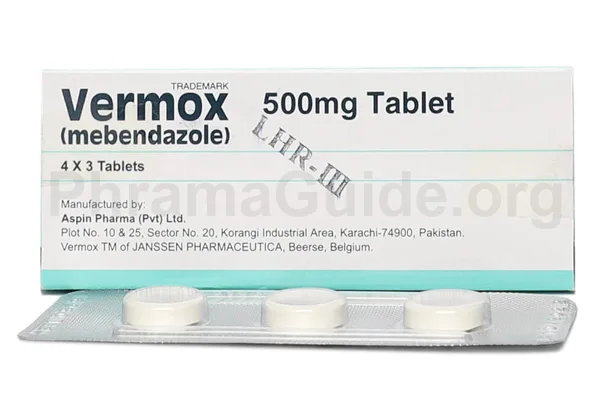Vermox is an anthelmintic medication commonly used to treat infections caused by parasitic worms. While generally well-tolerated, Vermox can still produce some common and less common side effects in individuals. Here are some common and less common side effects associated with Vermox.
Common Side Effects
- Gastrointestinal Disturbances: The most frequent side effects of Vermox include abdominal pain, nausea, vomiting, diarrhea, and sometimes a transient increase in liver enzymes. These symptoms are usually mild and tend to resolve on their own.
- Allergic Reactions: Some individuals may experience allergic reactions to Vermox, presenting as rash, itching, hives, swelling of the face, lips, or tongue, and in severe cases, difficulty breathing.
- Central Nervous System Effects: Rarely, Vermox can cause dizziness, headache, or a feeling of tiredness.
- Elevated Liver Enzymes: In some cases, Vermox might lead to a temporary increase in liver enzymes, which usually normalizes once the treatment is completed.
Less Common Side Effects
- Liver Problems: While transient elevations in liver enzymes are common, in rare instances, Vermox can cause more severe liver problems, such as hepatitis or liver damage. Symptoms might include jaundice (yellowing of the skin and eyes), abdominal pain, dark urine, and fatigue.
- Hypersensitivity Reactions: Allergic reactions to Vermox can manifest as severe skin reactions, including blistering, peeling, or Stevens-Johnson syndrome, a rare but serious condition affecting the skin and mucous membranes.
- Agranulocytosis: This condition involves a severe reduction in white blood cell count, specifically neutrophils, which are crucial for fighting infections. It’s an extremely rare side effect but can lead to increased susceptibility to infections.
- Neurological Effects: In very rare cases, Vermox has been associated with neurological symptoms such as confusion, hallucinations, or seizures.
- Hypersensitivity Pneumonitis: This is an uncommon inflammatory lung condition that might occur as an allergic reaction to Vermox, leading to symptoms like cough, difficulty breathing, and fever.
- Gastrointestinal Obstruction: Although uncommon, Vermox might rarely cause an intestinal blockage due to the expulsion of dead worms, particularly in cases with a heavy worm burden.
- Pancreatitis: Some cases of pancreatitis have been reported as a rare side effect of Vermox use.
- Hair Changes: Apart from hair loss, less commonly, Vermox might cause changes in hair texture or color.
- Blood Disorders: There have been rare reports of Vermox affecting blood cells, leading to changes in blood counts such as leukopenia (reduced white blood cells), thrombocytopenia (reduced platelets), or anemia.

What is Vermox?
Vermox is one of the leading brands of Mebendazole, manufactured and marketed by Aspin Pharma (Pvt) Ltd, Pakistan. Under the licenses of Janssen Pharmaceutica, Belgium.
Vermox : Available Formulations and Strengths
Presently, Vermox is available in Tablet and Syrup forms with the following strengths.
Vermox Tablet : 100mg and 500mg strengths.
Vermox Syrup : 100mg/5ml strength.
What Are The Possible Drug Interactions of Vermox?
- Cimetidine: Cimetidine, a medication used to treat ulcers and reflux, may potentially increase the levels of Vermox in the blood by inhibiting its breakdown. This interaction could lead to an increased risk of side effects.
- Anticonvulsants (Phenytoin, Carbamazepine, Phenobarbital): These medications might decrease the effectiveness of Vermox by increasing its breakdown in the liver, potentially reducing its efficacy.
- Warfarin: There are theoretical interactions between Vermox and warfarin, a blood thinner. Vermox could potentially enhance the effects of warfarin, increasing the risk of bleeding. Monitoring of clotting parameters may be necessary if these medications are used together.
- Anti-HIV Medications: Vermox might interact with certain anti-HIV drugs (protease inhibitors like ritonavir) by inhibiting their metabolism, possibly leading to increased blood levels and a higher risk of side effects.
- Other Antiparasitic Medications: Combining Vermox with other antiparasitic medications might lead to increased efficacy but could also increase the risk of side effects. It’s essential to use these combinations cautiously and under medical supervision.
- Grapefruit Juice: Grapefruit juice might inhibit the breakdown of Vermox, potentially increasing its blood levels and the risk of side effects. Avoiding grapefruit juice while taking Vermox is recommended.

Leave A Comment